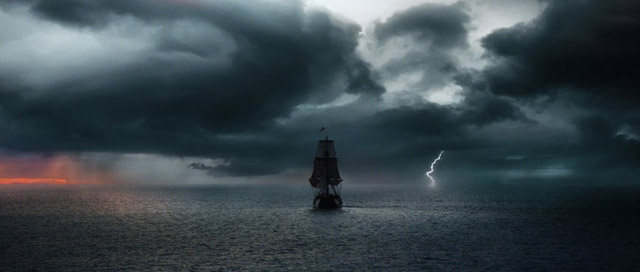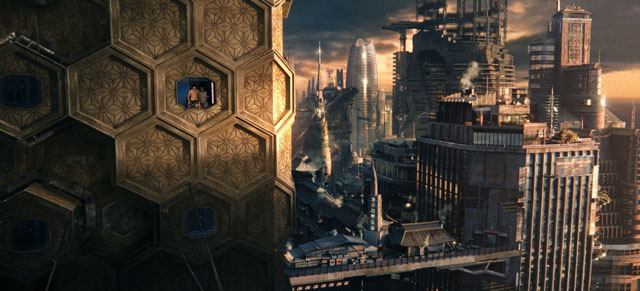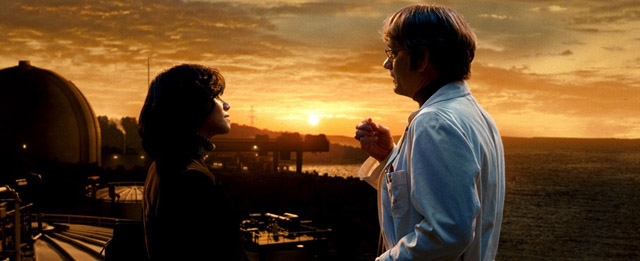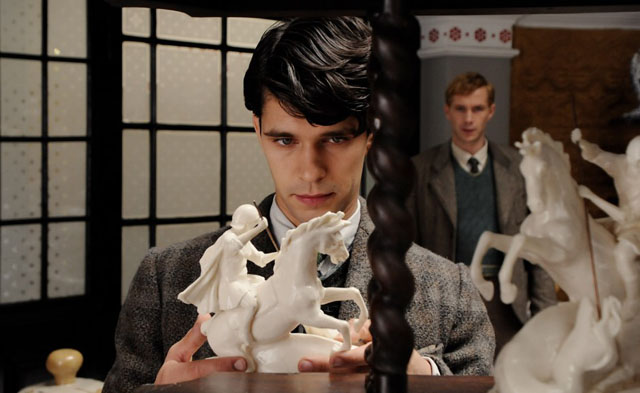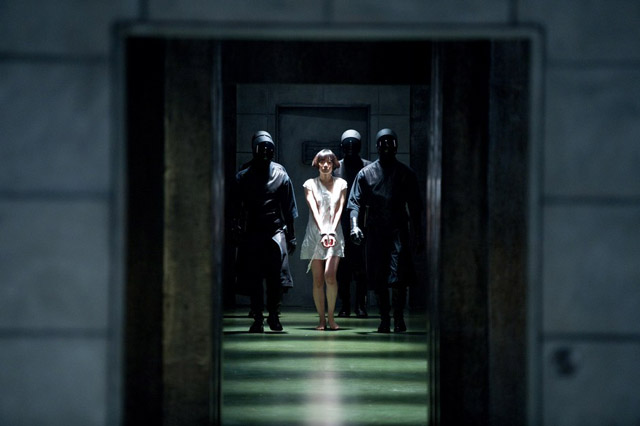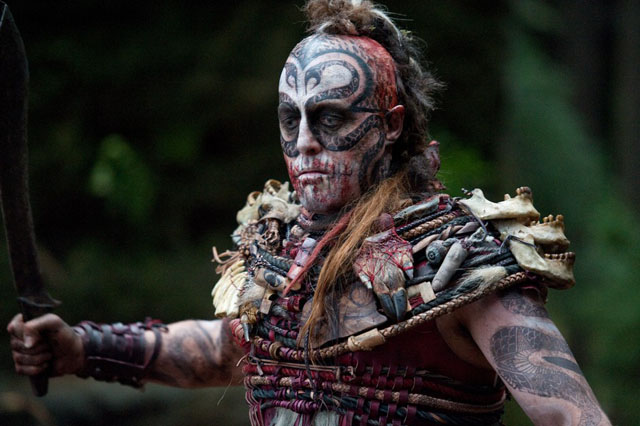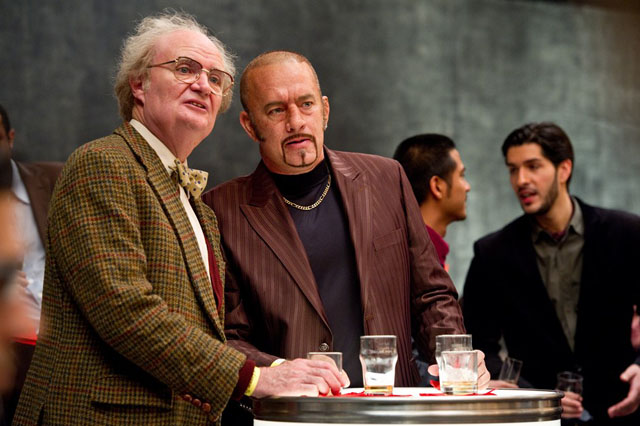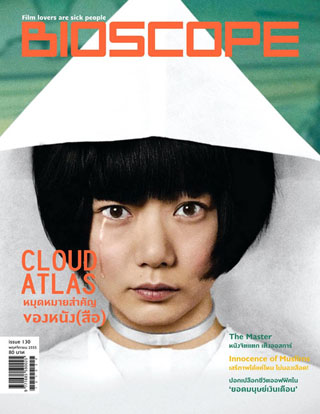A little over a month ago now, when Tom Tykwer and Andy and Lana Wachowski’s Cloud Atlas premiered in Toronto, we spent about a week posting initial reactions and reviews, the trailer and video from the press conference. Now, with the adaptation of David Mitchell’s Chinese box of a novel set to open on Friday, Round 2 has already begun.
New York‘s going with a dialogue between its book critic, Kathryn Schulz, and its film critic, David Edelstein, who notes that “one thing I loved about the novel was that each of its six subplots—the ‘Pacific Journal’ slave melodrama of the 19th century, the epistolary section from the early twentieth, the paranoid-conspiracy ’70s thriller, the present-day totalitarian old-age Kafkaesque yarn, the clone-war adventure of the near future, and the postapocalyptic jungle saga of the distant one—had its own integrity, its own style, its own present tense. From the start of the movie, we get a hash of crisscrossing plots tied together with music (in a desperate attempt at fluidity) and featuring the same actors with laughably egregious makeup jobs. Our dawning awareness in the book of all the echoes and crosscurrents becomes fast-food metaphysics on a cartoony canvas.”
Schulz is less harsh on the film and eventually brings up the issue that there’ll evidently be no getting around: “Many have objected to the use of ‘yellowface’ in the film—makeup-ing the heck out of white actors so they can play Korean roles. You’d have to be oblivious to the history of racism in the United States to blow past that objection, but if you were going to mount a defense of it here, you’d point to its literal and figurative contexts. The literal context is that every major actor in this film plays multiple roles, and many of them change gender and race along the way. The figurative context is the one you cite: the thematic emphasis on the transmigration of souls, which I think means we’re supposed to take the ‘yellowface’ and ‘whiteface’ and ‘womanface’ and whatever-face as a sign that oh, hey, we’re all just the same human soul underneath. Radical!”
For the New Yorker‘s Anthony Lane, “the best thing about Cloud Atlas is that it could, and should, turn into a properly divisive film, touching off feuds between the fervid and the splenetic, but one has to ask: does it allow for immersion? Even as we applaud the dramatic machinery, are we being kept emotionally at bay? One answer is to watch Cloud Atlas and then try Leos Carax’s Holy Motors, another new release in which an actor is forced to proliferate… I was stirred beyond reason by Carax’s notion that we might invest ourselves, plunging up to the hilt, in all that life and death demand of us, even though—or precisely because—we must feign those very feelings and move on. Such are the rules of the game. But Cloud Atlas refuses to acknowledge that it is a game. The directors are quite earnest about the appearance and reappearance of their various stars, inviting us to have genuine faith in the blah of eternal recurrence, and there is something grindingly circular in a film that exerts immense—and, to be fair, often spectacular—energy to connect human beings across space and time, only to conclude with the startling news that we are all connected.”
“I met the three directors in 2008, and their plan to foreground the novel’s ‘transmigrating souls’ motif by having actors perform multiple roles (each role being a sort of way station on that soul’s karmic journey) struck me as ingenious,” writes Mitchell himself in the New York Times Magazine. “Perhaps where text slides toward ambiguity, film inclines to specificity. A novel contains as many versions of itself as it has readers, whereas a film’s final cut vaporizes every other way it might have been made. Funny thing is, not even the author is immune to this colonization by the moving image. When I try to recall how I imagined my vanity-publisher character, Timothy Cavendish, before the movie, all I see now is Jim Broadbent’s face smiling back, devilishly. Which, as it happens, is fine by me.” He’s got more to say on all this in the Wall Street Journal, and Carolyn Kellogg interviews him for the Los Angeles Times.
“Cloud Atlas is a rare film that’s greater than the sum of its often innocuous parts,” argues Slant‘s Ed Gonzalez. “A gene splice of Blade Runner, Amadeus, Amistad, One Flew Over the Cuckoo’s Nest, Three Days of the Condor, and Game of Thrones, it transparently, sometimes naïvely, draws parallels between the pains and ecstasies of characters scattered across a vast human timeline, pondering the terrible things humans have done to themselves (and will do to themselves) with the witlessness of a failed poli-sci major. But there’s an undeniable earnestness to its philosophical fixations, and as maximalist collage, in which a door opens in one story only to open in another, a character from a recognizable yesteryear appears to converse with another from an imagined tomorrow, and the sounds of telecommunications, violence, and commerce, from the ringing of phones to the chugging of trains, it’s close to fabulous, its boundaries managing to transcend convention.”
All three directors, “even in failure, are virtuosic technical directors and they prove it again here,” argues Mark Keizer in Box Office. “The movie version has the exciting and challenging parts down but the moral awakening it so strenuously wants us to experience remains beyond its reach.”
Tykwer and the Wachowskis have been making the rounds, and you can read or watch profiles and interviews by Rebecca Keegan (LAT), Drew McWeeney (HitFix), Charles McGrath (New York Times), and David Poland (video, 36’38”). And then, there’s this:
Updates, 10/24: “It’s tempting to pull for a formally ambitious, queer-friendly, R-rated blockbuster that uses the word ‘amanuensis’ and seems designed to drag viewers into uncomfortable new idioms,” writes Nick Pinkerton. “There is, however, a viewing experience to consider. Each segment feels more like an extended trailer for itself than a sound narrative unit.” Also in the Voice, Nick Greene revisits the Wachowskis’ films and Simon Abrams chats with all three directors.
For Time Out New York‘s Keith Uhlich, “what the Wachowskis and Tykwer are attempting is crystal clear—a kind of epic, equal-opportunity parable about the transgression-cum-transcendence of rigid societal norms. (Expect plenty of think pieces paralleling the film’s gender- and race-bending theatrics with Lana’s own transsexuality.) Yet you never sense, as you do with Mitchell’s prose, that the directors have a vital grasp of the varied genres, nor of the profound themes that can spring from even the basest forms of storytelling. Instead, these disparate tales have been listlessly smashed together in the hopes that something substantial will emerge. For all of Cloud Atlas‘s pseudorevolutionary blather about upending the ‘natural order,’ the execution couldn’t be squarer.”
For Nicolas Rapold, writing in the L, ” the excess becomes folly thanks to a poverty of both imagination and means in populating these multiple worlds. Lacking the gloss of Inception or the overload of a multi-panel silent epic, Cloud Atlas practically makes you yearn for Quantum Leap with its chintzy production, makeup that fails laugh tests, Tom Hanks hamming his way through history, and, disappointing from the Matrix puppetmasters, derivative visions of the future.”
For Movieline, Jen Yamato talks with Doona Bae: “Like Sonmi-451, Bae’s world opened up with an unexpected offer from a stranger. A successful model and actress in her native South Korea, she starred in Park Chan-Wook’s Sympathy for Mr. Vengeance and Boon Jong-Ho’s The Host—two of the most popular Korean crossover hits of the last decade, although the humble Bae is still surprised to hear that American audiences may have seen her work. Courted for the role of Sonmi-451 by the Wachowskis themselves, Bae won the part, then took a crash course in English to film her scenes.”
Viewing (5’30”). Time presents an “exclusive” video, “The Making of Cloud Atlas.”
Updates, 10/25: “This is by no means the best movie of the year,” writes A.O. Scott in the New York Times, “but it may be the most movie you can get for the price of a single ticket. It blends farce, suspense, science fiction, melodrama and quite a bit more, not into an approximation of Mr. Mitchell’s graceful and virtuosic pastiche, but rather into an unruly grab bag of styles, effects and emotions held together, just barely, by a combination of outlandish daring and humble sincerity. Together, the filmmakers try so hard to give you everything—the secrets of the universe and the human heart; action, laughs and romance; tragedy and mystery—that you may wind up feeling both grateful and disappointed.”
“It is no accident, as Engels would say, that the impetus for the film version of Cloud Atlas should come from Lana and Andy Wachowski, who have made a career out of exploring the theme of human freedom via genre movies,” writes Glenn Kenny at MSN Movies. “Both their Matrix trilogy and V for Vendetta, the movie they produced but did not direct, explicitly deal with the exploitation of the powerless by the powerful, how these relations come into being, and what is to be done about them.” But: “the on-the-nose iterations of the themes of connection are pretty risible…. Similarly, the filmmaking itself, while incredibly advanced on a technological level, is kind of mind-numbingly literal.”
“Of course, nearly every story, from Oedipus Rex to Argo, portrays someone in revolt; that’s called fiction.” Time‘s Richard Corliss: “The question here is twofold: whether any of the individual Cloud Atlas tales packs enough suspense to fascinate the viewer, and, lacking that, whether the various story snippets, in concert, form some grand symphony. In both cases, the reluctant verdict is Not Quite.”
For Scott Wilson at the Nashville Scene, Cloud Atlas is “165 inert minutes of proof that what we talk about when we talk about unfilmable is not can but should. The gulf between the two has rarely been wider than it is here, and the answer is no, no, no.”
More from Matt Cohen (Cinespect), Richard Lawson (Atlantic Wire), and Keith Phipps (AV Club, B). Ray Pride interviews the Wachowskis for Newcity Film, and Tasha Robinson talks with all three directors at the AV Club.
Updates, 10/27: Indiewire‘s Eric Kohn moderates a discussion with B. Ruby Rich and Lisa Schwarzbaum. Rich: “After a lifetime as a happily snarky rock-thrower, I can’t believe I’ve ceded the role to Lisa and have to settle instead for the far less unsatisfying role of public defender in this Cloud Atlas drama. So okay, here goes. Tom Hanks? Not my favorite. But if you’re going to use him, really, this is the place – kinda Cast Away meets Forrest Gump with a dash of Da Vinci Code. And Halle Berry? Her recent choices of roles have been so disastrous that here at least she gets a full roster of them: black, white, Korean, space alien. The hop-scotching has a brio to it that carried me along. Yeah, of course they are all kinda recognizable across the ‘centuries’ (wink wink) but c’mon, Lisa, are you really going to carp about casting movie stars in a movie? I can’t imagine what else you’d want to do with them.” Schwarzbaum: “Hmmm, I do like the notion of a movie messing around with the salient features of movie stardom.” Still: “As a reader, the more I know/love a book, the more I want to keep the characters as I imagine them. And if others are going to imagine those characters into on-screen visibility, I kind of wish, with useless, criticky high-mindedness, for the casting of unknowns.”
Charles Mudede in the Stranger: “The first story is essentially Amistad, the second is anything by Merchant Ivory, the third is The Conversation, the fourth is Four Weddings and a Funeral (or any British comedy involving Hugh Grant), the fifth is The Matrix, and the last is somewhere between The Lord of the Rings and 2001. The best movie in this movie of movies is the one that’s like The Matrix—which, unsurprisingly, is directed by the Wachowskis (they directed the two futuristic films and the 19th-century one; Tykwer the rest). The Matrix-like segment, which stars Doona Bae (an actress who is soon to enter the sphere of global celebrity that’s shared by Gong Li and Michelle Yeoh) is fucking dazzling.”
“I have heard Cloud Atlas described by some folks as the best movie of the year, while others call it the worst,” notes the Philadelphia Weekly‘s Sean Burns. “The truth is that it usually feels like both at the same time.” The Austin Chronicle‘s Marc Savlov argues that Cloud Atlas “achieves near-perfection on virtually all levels.” And for the Philadelphia City Paper‘s Sam Adams, “for all its flaws, Cloud Atlas is a thrilling high-wire act, even more so when it stumbles and gets its footing back.” Salon‘s Andrew O’Hehir: “It’s an amazing, baffling, thrilling and (for many, it would appear) irritating experience, and for my money the most beautiful and distinctive big-screen vision of the year.” Trevor Link at Spectrum Culture: “Like any parable, Cloud Atlas‘ core is shockingly simple, but the depth of the ethical world it constructs, connecting actions separated by decades and centuries, is nothing short of ennobling in its massive scope.”
More from Ty Burr (Boston Globe, 2.5/4), A.A. Dowd (Time Out Chicago, 2/5), Roger Ebert (Chicago Sun-Times, 4/4), Kurt Halfyard (Twitch), Bruce Handy (Vanity Fair), Robert Horton (Herald), Peter Sobczynski (eFilmCritic, 2/5), Dave White (Movies.com), and Alison Willmore (Movieline, 8/10).
Ed Symkus gets a few words with Mitchell for the Phoenix, and the Telegraph chats up Susan Sarandon.
Listening (49’29”). Slate‘s Dana Stevens, John Swansburg, and Dan Kois discuss the film in a “Spoiler Special.”
Update, 10/28: Cloud Atlas “is a chore to get through, a numbing swirl of semi-incoherent storytelling, complicated makeup, and melodrama. It’s also occasionally magical.” At Grantland, Zach Baron references “[o]ne of the all-time great film-geek novels, Steve Erickson’s Zeroville,” Darren Aronofsky’s The Fountain, and Christian Marclay’s 2010 installation The Clock.
Updates, 10/29: “Whereas Speed Racer was a film so tough-minded (if simultaneously addle-brained) that it seemed to withstand my hate,” writes Michael Sicinski for Cinema Scope, “Cloud Atlas is an object for which, unexpectedly, I find myself feeling a tinge of protective tenderness. It’s not just that it’s an ‘interesting failure,’ although it is certainly that. It’s more that one would feel more comfortable were Cloud Atlas some kind of unmitigated disaster, which it is not. If it were, then we could chalk it up quite easily to the hubris of the Industry, the corrupting influence of big money, things like that. What actually ends up on screen is, like [D.W. Griffith‘s] Intolerance [1916], a film that is weird in ways both intended and not, an object that bears traces of compromise that mar any ambitious popular art. It succeeds in the most conventional ways (most of the stories are compelling, the three hours speed by at a brisk clip, not every Tom Hanks character comes off like an SNL sketch), but there is so much internalized pressure not to be too abstruse or go too long without a theme-articulating soliloquy that the directors hobble themselves, exhibiting too little faith in their abundant natural talents.”
“Cloud Atlas pushes the edge of the envelope of convention but not cinema,” writes Jason Bellamy. “From one point of view, its shape-shifting narrative is perfectly suited to cater to and reflect this era of stimulus-starved multitasking and attention deficiency. But from another angle, it’s behind the times: in an age of amateur mashup artists, the Wachowskis and Tykwer are asking audiences to be awestruck by a magic trick that has been demystified by DIY editing suites and YouTube.”
The Film Doctor posts eight notes on “the closest thing to James Joyce’s Ulysses to arrive at the cineplex all year.”
“What would the Cloud Atlas Sextet described in the novel actually sound like?” For Slate, J. Bryan Lowder explores the possibilities.
Update, 10/31: FirstShowing‘s Alex Billington talks with Ben Whishaw.
Updates, 11/3: “I’ll admit that I experienced Cloud Atlas mainly as the motion-picture equivalent of being cornered at a noisy party by three filmmakers expounding at length—with animated gestures and gusty yet sincere vehemence—on their philosophy of life, and I would argue that it’s worthwhile to figure out what that philosophy is,” writes the New Yorker‘s Richard Brody.
And that’s where Emily Eakin goes, deep and long, for the New York Review of Books. She outlines the contours of the Wachowskis’ tight relationship with Ken Wilber, “author of an ambitious effort to reconcile empirical knowledge and mystical experience in an ‘Integral Theory’ of existence…. [H]is admirers include not only the alternative-healing guru Deepak Chopra… but also the philosopher Charles Taylor, the theologians Harvey Cox and Michael Lerner, and Bill Clinton. Wilber’s generally lucid treatments of both Western science and Eastern spirituality have earned him favor with a coterie of highly literate seekers for whom the phrase ‘New Age’ is nonetheless suspect. He’s an intellectual’s mystic, short on ecstatic visions and long on exegeses of Habermas (whom he regards, for his perception of ‘homologous structures’ in human individual and social development, as something of a kindred spirit). At the Integral Institute, a Colorado-based think tank inspired by Wilber’s ideas, scholars like Jack Crittenden, a professor of political theory at Arizona State University, strive to apply his approach to ‘global-scale problems,’ from climate change to religious conflict.”
Update, 11/7: For Violet Lucca, writing in Film Comment, “the problems of this alternately impoverished and bloated threehour behemoth derive from both its source and its mode of adaptation.”
Updates, 11/11: “Nearly 20 years ago,” writes David Thomson for the New Republic, “the Wachowskis made a nice, toxic little B picture, Bound, with Gina Gershon, Jennifer Tilly, and Joe Pantoliano. It was rancid, hot and mean-spirited, and quite happy with that package. Alas, the Wachowskis are now determined to save the world with goodness. Resist.”
Listening. Slate‘s Emily Bazelon, Dan Kois, and Meghan O’Rourke discuss the book.
Update, 11/14: “In Speed Racer,” writes Dennis Cozzalio, “the Wachowskis experimented with telling simultaneous story strands, often within the same frame, all of which now seems like ample training for the sort of tonal, narrative juggling that goes on here. The movies are quite dissimilar in overall approach and effect, two distinct pieces of evidence that the Wachowskis may be our most outré, formally challenging mainstream filmmakers…. Cloud Atlas may not be another Speed Racer, but it’s a moving, silly, baffling, beautiful, unique beast all the same. I can’t wait to see it again.”
Updates, 11/18: “Unlike 95% of commercial movies,” writes Carson Lund in MUBI’s Notebook, Cloud Atlas “moves according to thematic rather than narrative logic. It runs just short of three hours, and could theoretically end at any moment once its central theses have been established. It offers neither narrative coherence, satisfying character development, or rational cutting rhythms—all qualities viewers have come to expect from a movie that costs this much. It is merely images and feelings, moving in time and ready to collapse at any moment…. Postmodernism has swallowed itself in Cloud Atlas: references and associations are no longer targeting an explicit metatextual realm but are rather subsumed into the film’s entire way of thinking. Cultural history, rolled out like a sprawling document, crumpled apart, and dispersed arbitrarily, is the very foundation upon which Cloud Atlas exists.”
Cinema Blend presents a spoilerific infographic charting “the karmic journeys of the movie’s characters.”
Update, 11/22: Reverse Shot‘s Jeff Reichert suggests that “if there were an award for ‘Most Editing’ it would be a shoo-in…. Cloud Atlas’s frenzied dicing highlights false equivalences Mitchell’s book studiously avoided: Jim Broadbent and a wily pack of wide-eyed geezers escaping a forced rest home, when intercut with freedom fighters trying to overturn a dictatorship in future Seoul, reveals the naggingly variable stakes of the source text’s many elements…. Cloud Atlas looks and feels all too schematic, eschewing the lushness of the best of Tykwer (Perfume) and the sleek stylishness of the Wachowskis’ The Matrix. (Some day their Speed Racer will likely be recognized as a film speaking a new cinematic language understandable only to six-month-old children and whales.) Despite their film’s surfeit of running, jumping, fighting, and shooting, this trio can’t manage to craft a single remarkable action sequence. This wouldn’t be a total loss if they’

